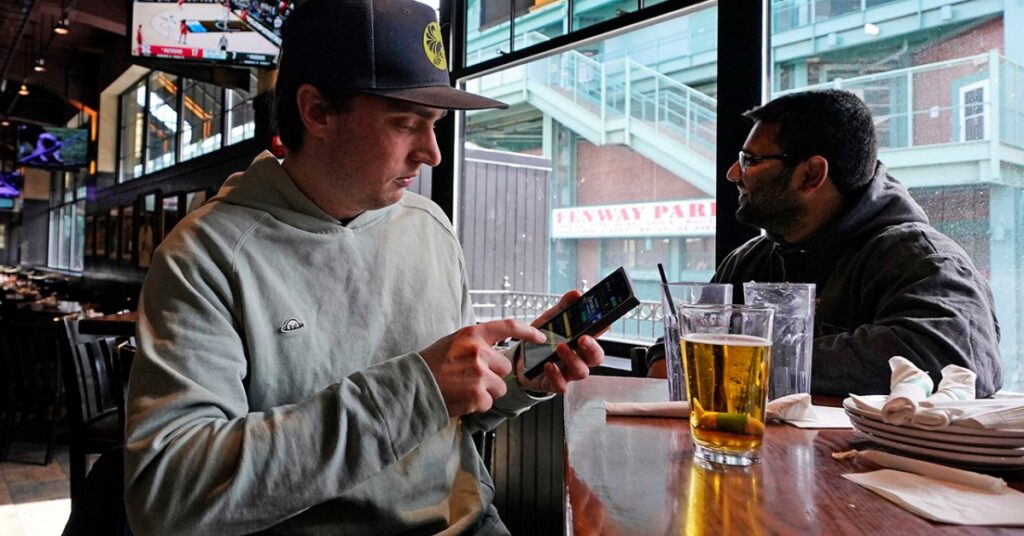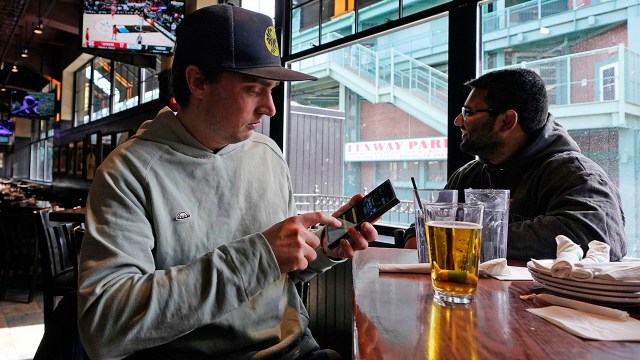
Public awareness of legal sports betting has grown in recent years – and so has the perception that it is a bad thing for society and sports, according to a new Pew Research Center survey.
Growing shares of Americans view legal sports betting as bad for society and sports
% of U.S. adults who say the fact that betting on sports is now legal in much of the country is __ for society/sports
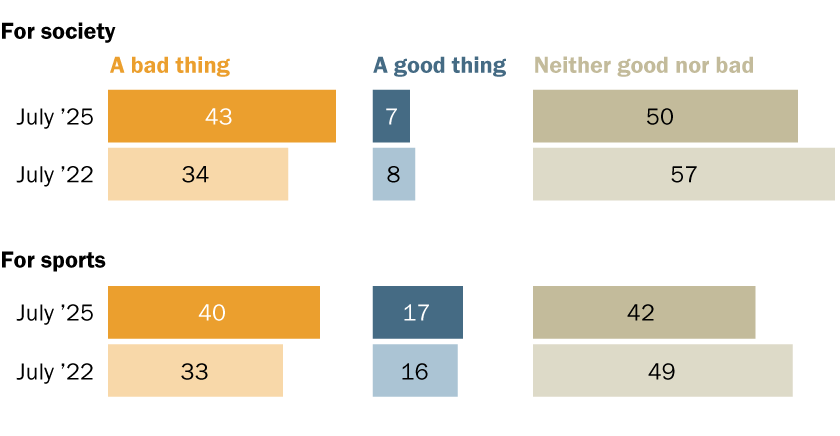
Note: Those who did not give an answer are not shown.
Source: Survey of U.S. adults conducted July 8-Aug. 3, 2025.
PEW RESEARCH CENTER
Growing shares of Americans view legal sports betting as bad for society and sports
% of U.S. adults who say the fact that betting on sports is now legal in much of the country is __ for society/sports
Note: Those who did not give an answer are not shown.
Source: Survey of U.S. adults conducted July 8-Aug. 3, 2025.
PEW RESEARCH CENTER
ChartDataShare
Today, 43% of U.S. adults say the fact that sports betting is now legal in much of the country is a bad thing for society. That’s up from 34% in 2022. And 40% of adults now say it’s a bad thing for sports, up from 33%.
Despite these increasingly critical views of legal sports betting, many Americans continue to say it has neither a bad nor good impact on society and on sports. Fewer than one-in-five see positive impacts.
About this research
This Pew Research Center analysis examines recent changes in Americans’ awareness of, attitudes about and personal experiences with sports betting. It comes as more states legalize the practice.
Why did we do this?
The Center conducts high-quality research to inform the public, journalists and decision-makers. Studying the public’s views of and experiences with sports betting is part of our long-standing research on social trends, technology and related topics.
Learn more about Pew Research Center.
How did we do this?
This analysis is based on findings from a survey of 9,916 U.S. adults who are part of the Center’s American Trends Panel. The survey was conducted from July 8 to Aug. 3, 2025. The survey’s overall margin of error is plus or minus 1.3 percentage points.
Here are the questions used for this analysis, the topline and the survey methodology.
Meanwhile, the share of Americans who have bet money on sports in the past year has not changed much since 2022.
Today, 22% of adults say they’ve personally bet money on sports in the past year. That’s a slight uptick from 19% three years ago. This figure includes betting in any of three ways:
With friends or family, such as in a private betting pool, fantasy league or casual bet
Online with a betting app, sportsbook or casino
In person at a casino, racetrack or betting kiosk
1 in 10 U.S. adults now say they have placed an online sports bet in the past year
% of U.S. adults who say they have personally bet money on sports in the following ways in the last 12 months
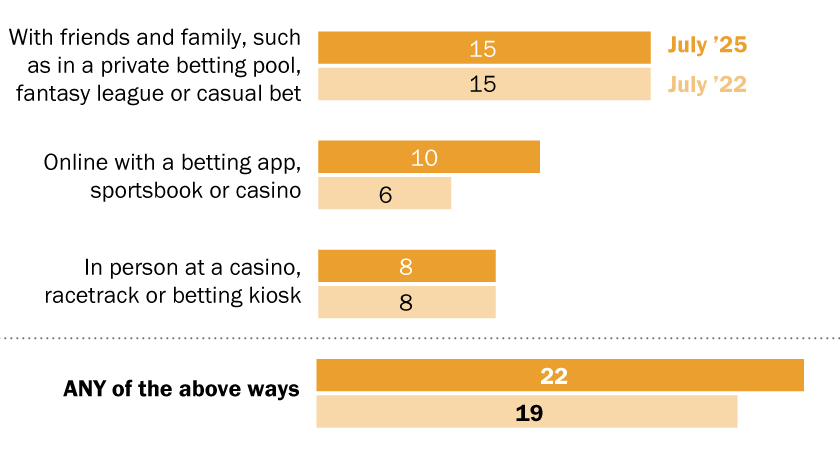
Source: Survey of U.S. adults conducted July 8-Aug. 3, 2025.
PEW RESEARCH CENTER
1 in 10 U.S. adults now say they have placed an online sports bet in the past year
% of U.S. adults who say they have personally bet money on sports in the following ways in the last 12 months
Source: Survey of U.S. adults conducted July 8-Aug. 3, 2025.
PEW RESEARCH CENTER
ChartDataShare
All of this increase has come through online sports betting: 10% of adults now say they’ve placed a bet this way in the past year, up from 6% in 2022. There has been no change in the shares of adults who have bet on sports with family or friends or in person at a casino, racetrack or betting kiosk.
Commercial sports betting has spread rapidly across the United States since a Supreme Court ruling in 2018 gave states the green light to legalize it. At least 38 states, the District of Columbia and Puerto Rico now allow commercial sports betting in some form, according to the National Conference of State Legislatures.
In our new survey, 63% of adults say they’ve heard or read a lot or a little about the fact that sports betting is now legal in much of the U.S. That’s up from 56% in 2022. The increase in public awareness comes as betting-related advertisements have become common during sports broadcasts.
The rest of this analysis takes a closer look at Americans’ views of and experiences with sports betting. It’s based on the survey of 9,916 U.S. adults, conducted in July and August.
Many demographic groups increasingly view legal sports betting as a bad thing
Across demographic groups, more Americans now see legal sports betting as bad for society
% who say the fact that betting on sports is now legal in much of the country is a bad thing for society
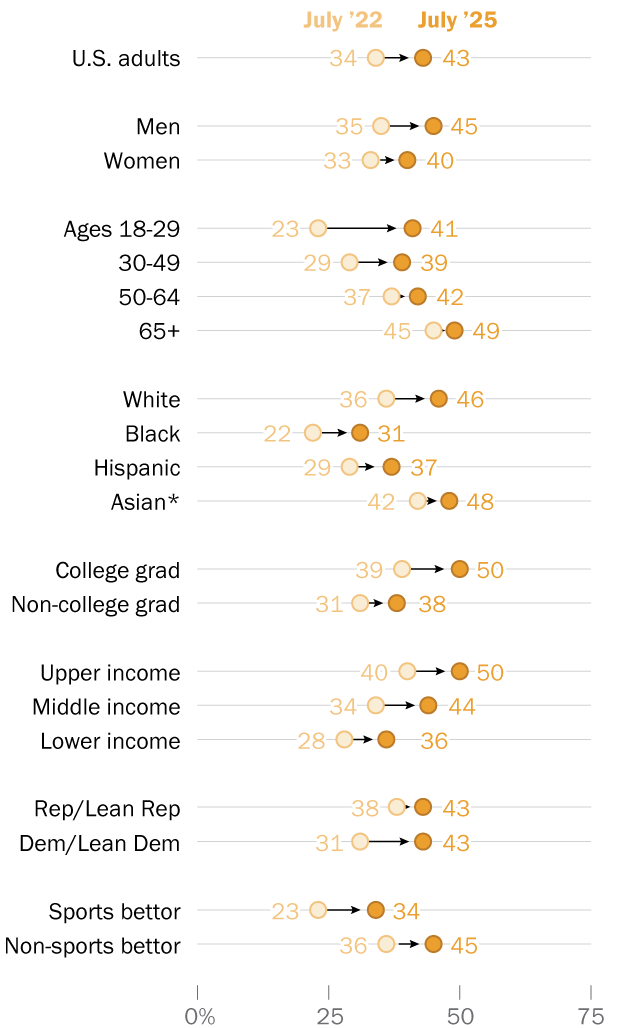
* Estimates for Asian adults are representative of English speakers only.
Note: White, Black and Asian adults include those who report being only one race and not Hispanic. Hispanic adults are of any race. Family income tiers are based on adjusted 2024 earnings. Sports bettors are adults who say, within the past year, they have personally bet money on sports in any of three ways asked about in the survey.
Source: Survey of U.S. adults conducted July 8-Aug. 3, 2025.
PEW RESEARCH CENTER
Across demographic groups, more Americans now see legal sports betting as bad for society
% who say the fact that betting on sports is now legal in much of the country is a bad thing for society
* Estimates for Asian adults are representative of English speakers only.
Note: White, Black and Asian adults include those who report being only one race and not Hispanic. Hispanic adults are of any race. Family income tiers are based on adjusted 2024 earnings. Sports bettors are adults who say, within the past year, they have personally bet money on sports in any of three ways asked about in the survey.
Source: Survey of U.S. adults conducted July 8-Aug. 3, 2025.
PEW RESEARCH CENTER
ChartDataShare
Since 2022, Americans in many demographic groups have become more likely to view the widespread legalization of sports betting as a bad thing for society, as well as for sports.
This is true for men and women; college graduates and non-college graduates; and upper-, middle- and lower-income Americans alike. It is also the case among Democrats and Republicans, as well as among those who have personally placed a sports bet in the past year and those who have not.
Some of the biggest shifts in attitudes about sports betting’s societal impact have come among young Americans – especially young men. Today, 47% of men under 30 say legal sports betting is a bad thing for society, up from 22% who said this in 2022. Women under 30 have also become more likely to express this view: 35% see legal sports betting as bad for society, up from 25% three years ago.
The legalization of sports betting has generated revenue for state governments and gambling operators, but it has also raised concerns about gambling addiction and other societal harms. Critics have also cautioned that it may compromise the integrity of sports. In recent years, several professional and college athletes and team personnel have been punished for violating betting rules.
Recent betting violations in professional sports
The largest professional sports leagues in North America – including the National Football League (NFL), Major League Baseball (MLB), the National Basketball Association (NBA), the National Hockey League (NHL) and Major League Soccer (MLS) – ban players, and often coaches and other personnel, from betting on their own sports. In some cases, there are also rules about betting on other sports. Punishments for violating the rules range from fines or suspensions to lifetime bans.
Since the U.S. Supreme Court’s 2018 decision to allow sports betting, at least 20 professional athletes in these five leagues – as well as one NFL coach and one MLB umpire – have faced disciplinary action for violating their leagues’ gambling policies. All but four of these disciplinary actions took place in 2023 and 2024, according to a Pew Research Center analysis of league announcements and media reports.
More than half of the athletes who have faced disciplinary action (11 of 20) were from the NFL. The rest involved players from MLB (five), MLS (two), the NBA (one) and the NHL (one).
In most cases, players received suspensions, ranging from several games to indefinite. However, in 2024, an MLB player and an NBA player each received permanent bans for betting on their own teams’ games.
Who has bet money on sports in the past year?
Young adults, Black and Hispanic Americans are more likely than other groups to bet on sports
% who say they have personally bet money on sports in the last 12 months with friends or family; online with a betting app, sportsbook or casino; or in person at a casino, racetrack or betting kiosk
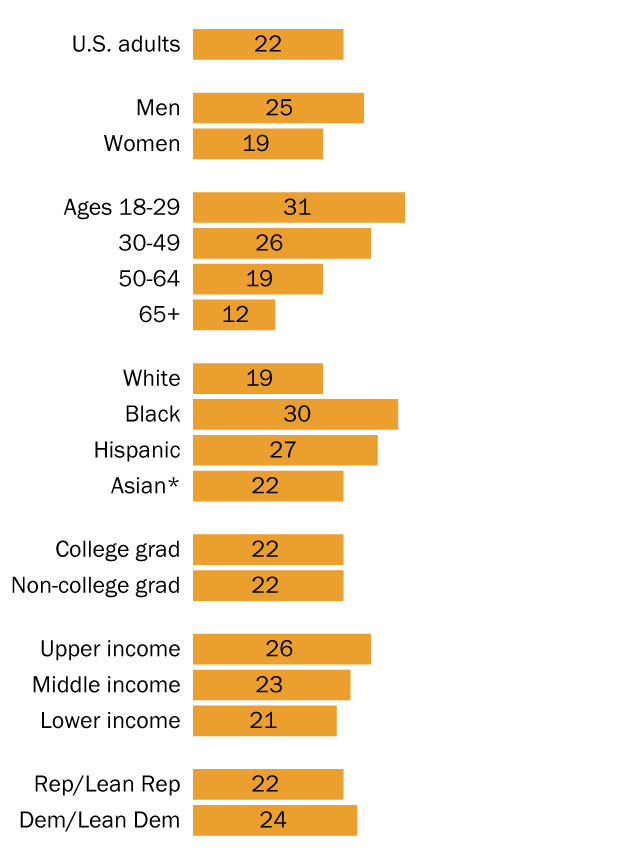
* Estimates for Asian adults are representative of English speakers only.
Note: White, Black and Asian adults include those who report being only one race and not Hispanic. Hispanic adults are of any race. Family income tiers are based on adjusted 2024 earnings. The full question wording was “With friends or family (such as a private betting pool, fantasy league, or casual bet).”
Source: Survey of U.S. adults conducted July 8-Aug. 3, 2025.
PEW RESEARCH CENTER
Young adults, Black and Hispanic Americans are more likely than other groups to bet on sports
% who say they have personally bet money on sports in the last 12 months with friends or family; online with a betting app, sportsbook or casino; or in person at a casino, racetrack or betting kiosk
* Estimates for Asian adults are representative of English speakers only.
Note: White, Black and Asian adults include those who report being only one race and not Hispanic. Hispanic adults are of any race. Family income tiers are based on adjusted 2024 earnings. The full question wording was “With friends or family (such as a private betting pool, fantasy league, or casual bet).”
Source: Survey of U.S. adults conducted July 8-Aug. 3, 2025.
PEW RESEARCH CENTER
ChartDataShare
As was the case in 2022, some groups of Americans are more likely than others to say they’ve personally bet money on sports in the past year in any of the ways we asked about.
Young adults are more likely than older Americans to say they’ve placed a sports bet in the past year. Some 31% of adults under 30 say this, including 36% of men and 29% of women in this age group. Sports betting is less common in all older age groups.
Black and Hispanic adults are also especially likely to have bet money on sports in the past year: 30% and 27%, respectively, say they have done so. Roughly two-in-ten Asian (22%) and White (19%) adults say the same.
There are no differences between college graduates and non-college graduates on this question. In each group, 22% say they have bet on sports in the past year. Nor are there major partisan differences: 24% of Democrats and Democratic-leaning independents say they have done so, as have 22% of Republicans and Republican leaners.
Who has placed an online sports bet in the past year?
When it comes to online sports betting, young adults and Black Americans again stand out.
Overall, 17% of adults under 30 – including 21% of men and 16% of women in this age group – say they’ve placed an online sports wager in the past year. Three years ago, 7% of those under 30 had done so – including 9% of men and 6% of women.
Among Black adults, 19% say they’ve placed an online sports bet in the past year, up from 10% in 2022. Smaller shares of Hispanic (12%), Asian (11%) and White (8%) adults say they’ve done this in the past year.
Note: Senior Writer Drew DeSilver and Research Analyst Ted Van Green contributed to this analysis. Here are the questions used, the topline and the survey methodology.


